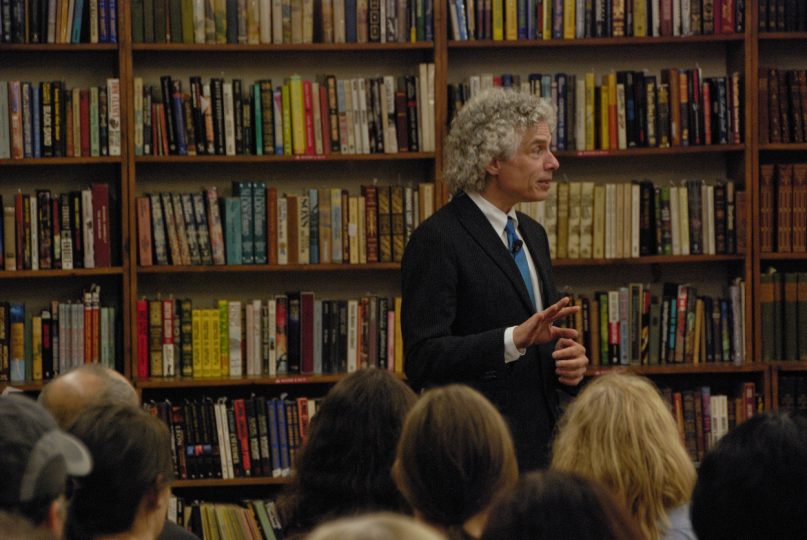EDITOR’S NOTE: Sightings is sponsored by the Martin Marty Center for the Public Understanding of Religion at the University of Chicago Divinity School. Sign up to get Sightings in your inbox twice per week (on Mondays and Thursdays). You can also follow us on Facebook or Twitter.
Tomorrow, Viking will publish Steven Pinker’s Enlightenment Now: The Case for Reason, Science, Humanism, and Progress, from which The Wall Street Journal ran an adapted excerpt on Saturday. To counter the profound gloom which is both fashionable and understandable these years, Pinker presents graphs and data which deserve to be reckoned with by fair-minded people. His conclusion is provocative, as anything by Pinker is likely to be. An excerpt from the WSJ excerpt:
Are the ideals of the Enlightenment too tepid to engage our animal spirits? Is the conquest of disease, famine, poverty, violence and ignorance … boring? Do people need to believe in magic, a father in the sky, a strong chief to protect the tribe, myths of heroic ancestors?
I don’t think so. Secular liberal democracies are the happiest and healthiest places on earth, and the favorite destinations of people who vote with their feet. And once you appreciate that the Enlightenment project of applying knowledge and sympathy to enhance human flourishing can succeed, it’s hard to imagine anything more heroic and glorious.
Pinker observes, quite accurately, that today “the left and the right concur on one thing: The world is getting worse.” He wouldn’t be Steven Pinker if he did not throw in a line about how those on both sides look back to a time when, among other things, “people found meaning in religion, family, community and nature.” Again, he is not inaccurate in that observation. But what about those of us who are grateful for the gifts of the Enlightenment and also for what he dismissively characterizes as belief in “magic, a father in the sky?” Where do we go from here?
Many of us who “sight” and cite the Enlightenment, as well as not “magic,” but faith, owe much to Pinker and those other Enlightened ones who, for the past two or three centuries, have merited our awe and gratitude for “applying knowledge and sympathy to enhance human flourishing.” And we give much thought to how we might relate simultaneously to both of these traditions.
Now let me go to, or over, the Sightings ethics line, which discourages advertisements for one’s causes, blurbs about his or her personal life, et cetera. I hope one can afford to be “edgy” on this front at least once every ninety years, so here goes:
This column is my way of saying thanks to the editors, publishers, fellows, alumni, and supporters of all stripes who in this column, and at a festive occasion last week, have helped me celebrate, in a very generous way, the twentieth anniversary of this Center and my ninetieth birthday. Among the kind things that numerous speakers and audience members offered during that event was one repeated line which surprised me: I was typed by them as (I must say, my own sort of) an “optimist.” Usually I run from that characterization, remembering lines from of old: “The optimist fell ten stories. / At each window bar / He shouted to his friends: / ‘All right so far.’”
Colleague and sometime co-teacher David Tracy collegially taught me to be aware of the limits to all human existence and events. He stressed that we must learn to live with “finitude, contingency, and transience.” If awareness of those three is not enough to kill “optimism,” what could? By the same token, why must “faith” and “Enlightenment” be seen only as contradictions of each other? Most sentient humans, as individuals and in groups, find sundry ways of being, thinking, and acting. In my faith tradition we speak of the human creature as being simul iustus et peccator, “at the same time righteous and a sinner.” Which of these sides of our humanity manifests in various circumstances depends upon what kinds of questions are asked, and what perspectives and intentions are in play.
This life-long member of the “simul” club will continue to see himself as an heir of both the Enlightenment and faith traditions, and, simultaneously, as a grateful critic of Steven Pinker, as he continues to nurture the Enlightenment project.





